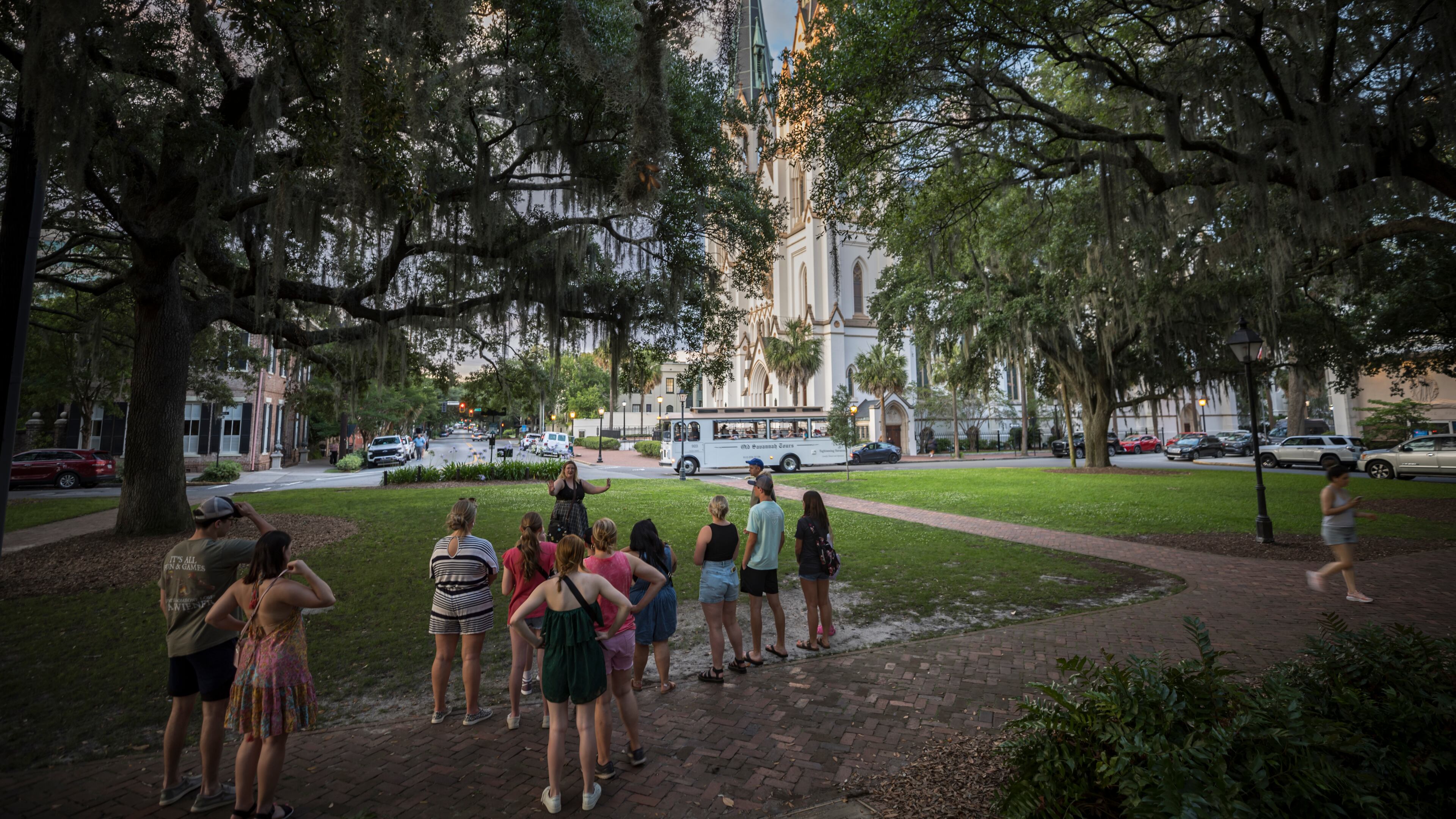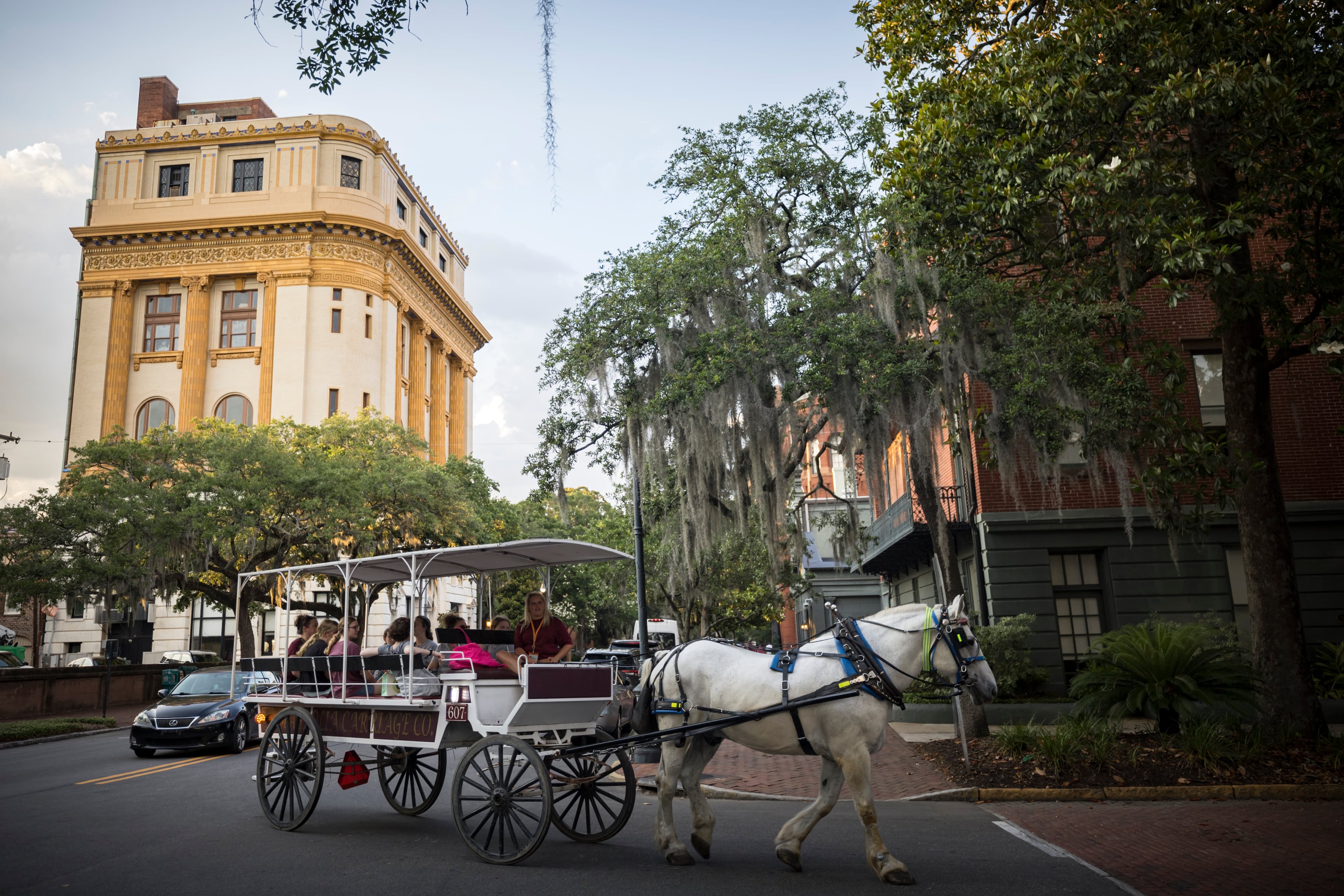Charming or nuisances? Savannah gets tough on tour operators

SAVANNAH — Mayor Van Johnson’s reelection victory lap was nearing the finish line this January when he addressed the Rotary Club of Savannah.
He used the 15-minute speech to lay out his priorities for his final term. When he got to tourism, an economic driver in the city and an industry that employs more than 28,000 workers, attendees sat forward in their chairs.
“Savannah must be a great place to live, first,” Johnson said. “We’ve reached the tipping point, and we are going to have balance.”
Johnson called on historic district tour operators, some of whom were in the room, to heed residents’ complaints about disruptive tours and find solutions. He vowed that the City Council would step in if necessary.
Five months later, companies operating trolley, horse-drawn carriage and walking tours are remaking their business models. The Savannah City Council recently enacted a new noise ordinance for trolleys. City staff, at the council’s direction, is reviewing the existing horse-drawn carriage ordinance and considering an outright ban.

As for walking tours, which draw frequent criticism for blocking sidewalks and noise from bellowing guides, neither the city staff nor the council has yet to announce a formal review. Even so, the city’s 108 operators should “recognize the handwriting on the wall” and alter their business practices, the mayor said.
Downtown residents are applauding the city’s stand, and some operators are taking steps to address issues. The market’s largest trolley operator, Old Town Trolley, is testing directional speakers to reduce the noise from their vehicles, and walking tour companies are adopting in-ear technology to be less annoying.
“Savannah’s secret sauce is that we’ve been able to strike a balance in these conflicting areas,” Johnson said. “I’ve been places where downtowns are lively but nobody lives there. Here, that’s not the case.”
Noisy nuisances
Downtown residents know Savannah’s charms come with trade-offs.
Living on or near a square or park means you share your front yard with the public. Living in a historic home means you can’t take advantage of modern sound-dampening materials, such as double-pane windows. And don’t even get a downtowner started on sidewalks or parking.
Trolley buses and walking tour groups are noisy. Guides deliver historical tidbits right in front of homes and businesses, sometimes staying in one spot for many minutes. In May, one homeowner got into an ugly altercation with a trolley operator over his parking in front of her residence for a long period of time while guests toured a house across the street.
Limiting amplified sounds — either from trolley speakers or guides’ mouths — is the city’s goal. The new trolley ordinance gives the three local operators three years to install public address systems that cannot be heard 15-feet away from the center of the vehicle. Walking tour guidelines are still being formulated.
The two most likely methods tour companies can adopt are directional speakers and in-ear communicators.
Trolleys currently are equipped with a series of speakers located in the bus’ ceiling, instead of directional speakers, such as those used in museum galleries.
Old Town Trolley has outfitted one of its vehicles with the directional speakers, mounting them across the front of the passenger compartment and aiming them directly toward the back. Test results have been positive, said Garry Patrick, the operator’s general manager.
Installing directional speakers across Old Town’s 50-vehicle fleet will be an expensive endeavor. The system costs about $12,000 per trolley, amounting to a $600,000 outlay for the business.
Patrick says the directional speakers are preferable to the in-ear communicators popular with tour operators in big cities because they block out most other noise.
In Savannah, the sounds of nature are part of the tour soundtrack. Plus, Patrick says, the earbuds are an ongoing expense while the directional speakers are a one-time deal.
“We’ll do our part because our business is not going backward; tourism in Savannah is going to continue to grow,” he said.
Savannah’s other two trolley tour operators, Old Savannah Tours and Kelly Tours, have yet to announce their approach to complying with the ordinance.
Walking tour operators don’t have the directional speaker option trolleys do. At least one company is using the in-ear system.

Another walking tour issue is the size of groups. The current ordinance allows up to 30 guests per tour, a number critics say is difficult for guides to manage. Blocked sidewalks are a maddening issue for residents, said David McDonald, president of the Downtown Neighborhood Association.
The downtown residents’ group is pushing the city to cut the limit in half.
“I’ve been cussed at for politely pushing my way through a tour group spread out across the sidewalk,” McDonald said. “Maybe 15 is too ambitious, but 30 is too many.”
Horse debate
The issue with Savannah’s horse-drawn carriage operators has nothing to do with the sound of clippity-clop of horse’s hoofs on brick streets.
Instead, animal welfare activists are lobbying the city to put horse-drawn carriage operators in a horse collar. A local group has adopted pressure campaign tactics used by like-minded peers across the country to renew calls to restrict or ban the use of horses in the tourism industry. They host social media channels, hold monthly protests based on their stance that city streets are unsafe for horses and encourage members of the public to lobby City Council members.
They’ve found a pair of influential allies in Savannah City Council Members Nick Palumbo and Kurtis Purtee.
Savannah operators draw particular scrutiny because of the city’s hot and humid summer days. An ordinance last revised in 2017 requires companies to pull their horses off the streets when temperatures hit 95 degrees or the heat index reaches 109 degrees. Palumbo said those conditions don’t take into account the heat radiating off the downtown streets. And with Savannah’s summers trending hotter and longer over the past 15 years, he said “it’s time for a transition away from those businesses.”

A proposed revision would drop that limit to 94 degrees, although the operator of two of Savannah’s three horse-drawn carriage companies, Cara Marshall, said she ceases operations once the weather eclipses 90 degrees.
She said her staff constantly monitors the condition of their horses, all of which are plow animals purchased from Amish farmers in Pennsylvania and Ohio. They take temperatures, add electrolytes to their diets and on hot and humid days increase the amount of salt in their feed to encourage them to drink more water for better hydration.
“We know these animals,” Marshall said. “I spend more time with my horses than I do my family. They are part of my family.”
The city official heading the 60-day horse carriage ordinance review, Susan Broker, said operators “do a good job of regulating themselves” and that data and science will ultimately determine the recommendation made to the City Council regarding the ordinance.
Ordinances need teeth
Downtown residents such as McDonald appreciate city officials’ efforts to regulate the tours, but they are worried about enforcement.
The city’s code compliance officers, not Savannah police, write citations. Currently, the four-person department is down two staffers. City officials say they are close to filling the vacancies.
Residents claim many operators flaunt the existing ordinances. McDonald cites Savannah’s population growth and new tourism offerings as stimulating demand for tours.
He points to a nearly completed expansion of the Savannah Convention Center that will allow the facility to host conferences with 4,000 attendees.
“That’s a lot of spouses and families who will be in town to take tours and enjoy the beauty of Savannah,” McDonald said. “But the residents have a right to enjoy the city’s charms, too. Now is the time to get a handle on it.”



